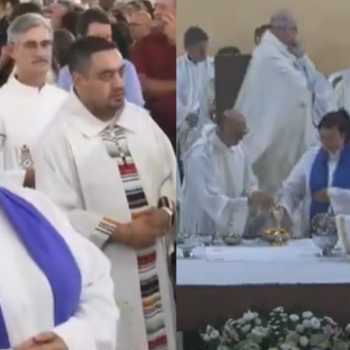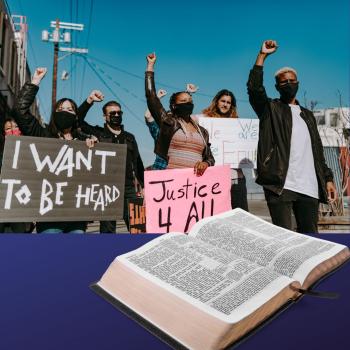But just in case you need a refresher, the Catechism of the Catholic Church outlines this relationship with the Blessed Trinity, and our true reason for being and our true destiny, in its very first paragraph:
God, infinitely perfect and blessed in himself, in a plan of sheer goodness freely created man to make him share in his own blessed life. For this reason, at every time and in every place, God draws close to man. He calls man to seek him, to know him, to love him with all his strength. He calls together all men, scattered and divided by sin, into the unity of his family, the Church. To accomplish this, when the fullness of time had come, God sent his Son as Redeemer and Savior. In his Son and through him, he invites men to become, in the Holy Spirit, his adopted children and thus heirs of his blessed life. (CCC, par. 1.)
As mentioned, God's inner workings revolve around an eternal exchange of love. God ceaselessly call us into relationship "at every time and in every place." This is a big part of the "what" that God does.
If the Trinity is an eternal exchange of love, then its primary action or raison d'être is all about relationships—between the members of the Trinity and with us. This exchange of love motivates and animates all that God creates and does. God's revelation of Himself and His ultimate plan of redemption flows from this love. For God cannot deny Who God is at His most intimate core.
Christians, baptized in the name of the Father, Son, and Holy Spirit, are destined to share in that eternal exchange of love. Baptism is both a future promise of heaven, and of the relationship shared with God even now.
Let's spell it out the way the Church does:
The ultimate end of the whole divine economy is the entry of God's creatures into the perfect unity of the Blessed Trinity. But even now we are called to be a dwelling for the Most Holy Trinity. (CCC, par. 260)
The "divine economy" is Church-speak for what is most easily defined as the work of the Trinity throughout history. It is the Godhead's initiation and movement in creation, and the divine governing of it. It is everything God does in the vast thing we call "God's Plan." The divine economy concerns the salvation of persons and the world, and a final, ultimate, cosmic, beyond-what-our-brains-can-fathom, entering in union with the Trinity.
The Trinity does what the Trinity is: the triune God of Love invites human persons to union with itself, and provides the means for that to happen via Christ and the Church. As the members of the Trinity are inseparable as divine persons, so, too, is their work inseparable from one another. This also means that the work of Christ is inseparable from the Church to which He is permanently wed.
Looking to the Church's wisdom and graces can assist our growth in the love and knowledge of the Trinity, that one day we, too, may be numbered among the saints in glory.
O my God, Trinity whom I adore, help me forget myself entirely so to establish myself in you, unmovable and peaceful as if my soul were already in eternity. May nothing be able to trouble my peace or make me leave you, O my unchanging God, but may each minute bring me more deeply into your mystery! Grant my soul peace. Make it your heaven, your beloved dwelling and the place of your rest. May I never abandon you there, but may I be there, whole and entire, completely vigilant in my faith, entirely adoring, and wholly given over to your creative action. (Prayer of Blessed Elizabeth of the Trinity)





